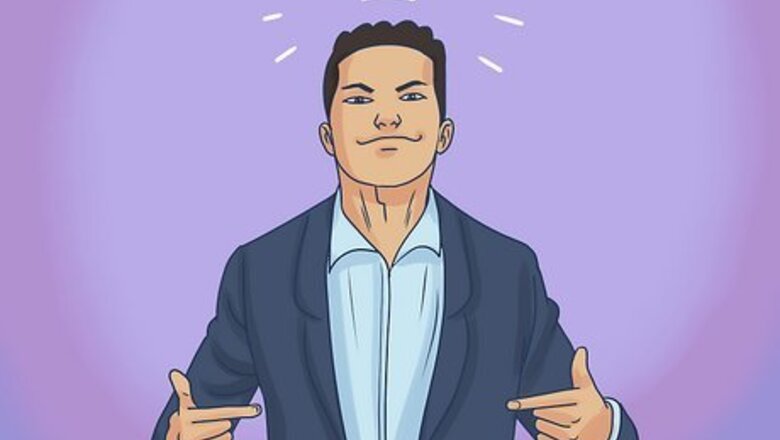
views
- Grandiose narcissists often have an overly-inflated sense of self-importance and believe themselves to be superior to others.
- People with grandiose narcissism may act arrogant to receive praise or manipulate others to get what they want.
- When dealing with a grandiose narcissist, remain calm and clearly establish boundaries about which behaviors of theirs are and aren’t acceptable.
What is a grandiose narcissist?
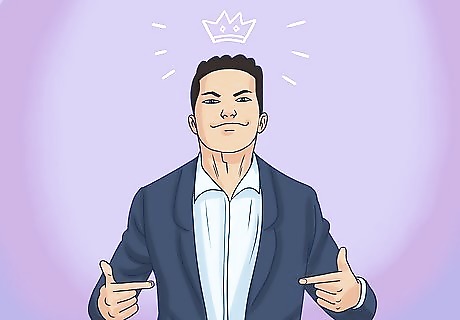
Grandiose narcissists have an overly-inflated sense of self-importance. Grandiose narcissism is one subcategory of narcissistic personality disorder (NPD). People who display grandiose narcissism often have inflated self-esteem and view themselves as superior to everyone around them. They tend to act out of a desire to receive recognition, praise, and admiration (even if they don’t necessarily deserve it) and can be quite competitive. Narcissistic personality disorder is officially classified as a mental health disorder.
Signs of a Grandiose Narcissist

Outgoing and extroverted behavior Grandiose narcissists usually aren’t afraid to be in the spotlight. In fact, they often crave other people’s attention and will do what they can to make sure all eyes are on them. They often appear very outgoing around others, and some people might even describe them as being very charming and engaging. It’s not uncommon to find people with NPD in leadership roles. Their success could be a combination of their personable appearances and overly-inflated sense of self-importance that can make them very ambitious.

Exaggerated self-image A tell-tale sign of grandiose narcissism is if a person views themselves as superior to and more important than everyone around them. They often make themselves the main characters of fantasies where they have absolute power and are high above everyone else. For example, a narcissistic friend might disregard your problems and only talk about themself when you meet up because they think their problems are more important than yours. Grandiose narcissists also tend to view themselves as “special” compared to others and might refuse to interact with “ordinary” people. They may also have a tendency to monopolize conversations and belittle other people’s opinions.

Sense of entitlement Grandiose narcissists tend to view themselves as being far more important than others and usually expect to be given special treatment. They might also not be afraid to trample over others to get what they believe rightfully belongs to them. For example, a grandiose narcissist may have no reservations about cheating on tests, cutting in line, or even stealing. Another scenario would be a coworker with grandiose narcissism who believes they deserve a promotion despite their work performance being sub-par. A narcissistic family member might demand that you drop everything and spend all of your time with them even if you have important things going on in your life.
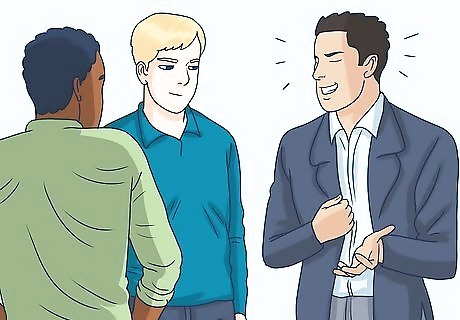
Arrogant and boastful attitude People with grandiose narcissism tend to purposefully seek out admiration and praise from others and usually aren’t afraid to boast about their accomplishments. If you mention an accomplishment of yours to them, they’ll likely become envious and may try to one-up you. In extreme cases, they might even lie about their successes so that they still come out on top. For example, a narcissistic friend might feel the need to brag about how well they’re doing at work when you mention a project you’re working on that you’re proud of. They might also act very arrogant or snobby and complain about things not being good enough for them. This is usually so that they can show off how high of expectations they have for themselves and others. For instance, a narcissistic family member might berate you for making a small mistake and say something like, “I never make mistakes. If it had been me, this wouldn’t have happened.”

Lack of empathy A major symptom of grandiose narcissism is a person’s inability or unwillingness to understand other people’s emotions. A grandiose narcissist may simply be unable to empathize with another person, or they may view the other person’s emotions as unimportant. Even if they’ve hurt you, a grandiose narcissist may not realize how much damage they’ve caused. For example, even after a narcissistic friend has said something hurtful or insulting to you, they may not understand why you’re upset and angry with them. Or, a narcissistic partner might brush you off when you try to confide in them about a problem you’re having.

Controlling and manipulative behavior A grandiose narcissist’s sense of entitlement can cause them to be very controlling and overbearing, and they may not hesitate to use manipulative behaviors like lying or exaggerating to make others comply. In particular, narcissists tend to use gaslighting, which is a way to make other people doubt themselves and feel guilty even if they’re not at fault. For example, a grandiose narcissist may say, “I don’t think that happened. Are you sure you’re remembering it correctly?” In relationships, narcissists might also use isolation to manipulate their partner. For example, they might make up excuses why they can’t visit their partner’s family in order to keep their partner to themselves.

Aggressiveness If provoked, grandiose narcissists can sometimes turn aggressive and vengeful, especially if they feel like they’re being attacked or criticized. For example, they might start hurtful rumors about a coworker who confronted them. In some cases, a narcissist could turn physically aggressive or use belittling language to hurt others. Another example would be a friend with grandiose narcissism calling you weak and overly sensitive when you try to talk to them about their behavior. If you’re in a relationship that has turned abusive, call the National Domestic Violence Hotline at 800-799-7233.

Unwillingness to accept responsibility Rather than own up to their mistakes and shortcomings, a grandiose narcissist is more likely to shift the blame onto someone else and play the victim. For example, they might blame you for a problem they caused by saying something like, “I wouldn’t have done that if you spent more time with me.” If a narcissistic coworker gets reprimanded by your boss, they might claim that your boss is being unfairly strict with them instead of taking responsibility. Or, a narcissistic partner might criticize you for not cleaning around the house when they themselves haven’t done anything to help out.

Impulsivity People with NPD oftentimes have difficulty regulating their emotions and behaviors, and this can cause them to act very impulsively. Their need to be recognized and praised can also drive them to engage in very risky behaviors, such as gambling, substance abuse, or cheating on their partner. A grandiose narcissist often imagines themselves as being all-powerful and all-knowing, and this invincible view of themselves can cause them to take even more risks. For example, a partner with grandiose narcissism might, unfortunately, turn to cheating to satisfy their needs. However, due to these feelings of invincibility, they may purposefully not try that hard to cover up what they’re doing.
Grandiose Narcissist vs. Vulnerable Narcissist

Grandiose narcissists want power; vulnerable narcissists want validation. Compared to grandiose (overt) narcissists, vulnerable (covert) narcissists often behave narcissistically in order to make up for their feelings of insecurity and low self-esteem. Vulnerable narcissists are often more introverted and usually use more passive-aggressive behavior to get validation and sympathy from others. Grandiose narcissists, on the other hand, are much more assertive and dominating in order to establish their superiority. For example, in order to get praise from others, a grandiose narcissist is more likely to brag and boast about their achievements. On the other hand, a vulnerable narcissist might say self-deprecating things like, “I’m not good at anything” in order to get people’s praise in the form of sympathy.
How to Deal with a Grandiose Narcissist

Don’t take their criticism personally. Oftentimes, someone with NPD will project their own insecurities onto you by saying belittling or hurtful comments. Don’t allow yourself to view their words as an accurate representation of who you are. Instead, ask yourself why they may be lashing out at you and if there’s a possible underlying issue that they’re not addressing. Ask them what’s wrong and offer help if you feel like it’ll benefit them. Use positive affirmations to remind yourself of your strengths and good qualities. Say things like: I am a good person. I deserve to be loved. I am strong. I am doing my best.

Stay calm when confronting them about their behavior. Before you go and confront a narcissist, take some time to calm down and collect your thoughts. If you’re feeling really worked up when you talk to them, you might end up saying something that just escalates the situation. When you do confront them about how their behavior has been affecting you, speak calmly and clearly. Oftentimes, a narcissist is looking to get a big reaction out of you. If you don’t give it to them, they may back down and be more willing to listen. When confronting them, Use “I” language to focus your statements on your emotions and avoid making it sound like you’re blaming them. For example, instead of saying, “You always say rude things to me,” say, “I feel extremely hurt when you criticize me.” Stay calm but be assertive about your feelings and explicitly tell them how their behavior is affecting you.

Set clear boundaries with consequences. Establishing clear boundaries about what behaviors are and aren’t acceptable is key to making sure a narcissist doesn’t continue to hurt you. An example would be establishing that a narcissist isn’t allowed to make belittling comments, or that they must respect your opinion. Make sure these boundaries also have consequences that you’ll be willing to act on if the other person breaks them. For example, consequences for a partner who doesn’t respect your boundaries could be things like not contacting them for a while, moving out, or breaking up with them. For a coworker whose grandiose narcissism is affecting you, you might tell them that you’ll go to your supervisor or HR if they don’t respect you and your boundaries.

Take a break and evaluate your relationship. If a person’s narcissistic behavior is becoming too much for you and negatively impacting your daily life, consider stepping back from them for a while so that you can reevaluate the situation. Take this time to self-reflect and sort through your emotions. Honestly evaluate your relationship with this person by asking yourself if being with them is hurting you more than helping you. Reflect on what you want in a relationship and if your needs are being met with this other person. While you take a break, make sure to take care of yourself by getting enough sleep, eating 3 meals a day, and taking time to pursue hobbies and activities you enjoy.
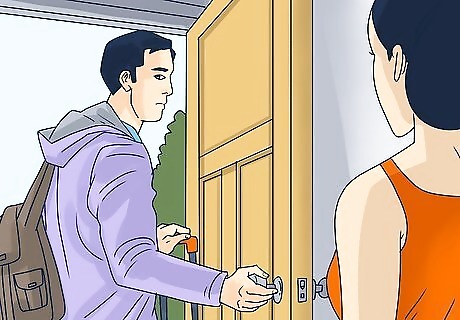
End the relationship if it’s becoming toxic. If you believe that being with a narcissist is harming you, it might be time to end this toxic relationship. If you do decide to end things, keep in mind that you don’t owe them a long explanation for your decision. State your intentions and give any reasons you feel comfortable sharing, then work to move on from the relationship. While it can definitely hurt to have to leave someone, it’s important to remember that some narcissists can’t or may be unwilling to change. If this isn’t something you think you can deal with, leaving them might be the best option for both of you.

Encourage them to get help from a professional. While there is no cure for NPD, working with a therapist can help someone with NPD acknowledge and learn how to manage their behaviors. If you want to continue your relationship with a friend, family member, or significant other with NPD, encourage them to see a therapist. Seeing a therapist might also help them deal with other underlying issues that are more common in people with NPD, such as depression.

Talk to a therapist for extra support. Seeing a therapist can give you extra support and encouragement from a professional who can help you better understand a person with NPD and their behavior. Therapy provides you with a safe environment to voice your concerns and thoughts, and your therapist may be able to provide you with exercises to help you deal with the many emotions you may be feeling. If you’re in a relationship with someone who has NPD, attending couples counseling might help you two communicate with and understand one another better. Use a service like BetterHelp to find a licensed therapist near you.












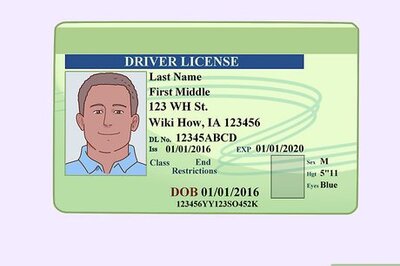





Comments
0 comment